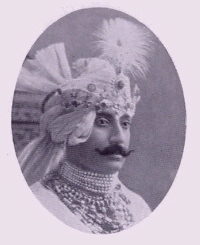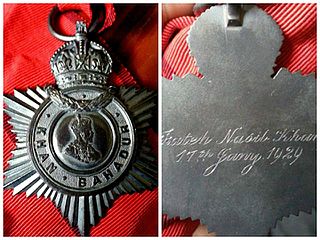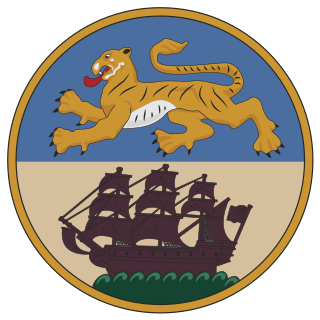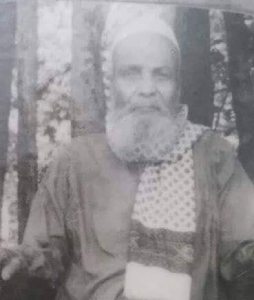Related Research Articles

Liaquat Ali Khan was a Pakistani lawyer, politician and statesman who served as the first prime minister of Pakistan from 1947 until his assassination in 1951. He was one of the leading figures of the Pakistan Movement and is revered as Quaid-e-Millat.
Nawab Ali Haider Khan was a Bengali noble and politician.

Begum Qudsia Aijaz Rasul was the only Muslim woman in the Constituent Assembly of India that drafted the Constitution of India.

Sir Syed Muhammad Saadulla KCIE was the 1st Prime Minister of Assam in British India from 1937 to 1946.He was also the member of Constituent Assembly of India from 1946 to 1950.

The Imperial Legislative Council (ILC) was the legislature of British India from 1861 to 1947. It was established under the Charter Act of 1853 by providing for the addition of 6 additional members to the Governor General Council for legislative purposes. Thus, the act separated the legislative and executive functions of the council and it was this body within the Governor General's Council which came to known as the Indian/Central Legislative Council. In 1861 it was renamed as Imperial Legislative Council and the strength was increased.

Sir Sayyid Wasif Ali Mirza Khan Bahadur was the Nawab of Murshidabad during 1906–1959. Sir Wasif Ali Mirza was educated at Sherborne School, Rugby School and later at Trinity College. He succeeded his father Hassan Ali Mirza Khan Bahadur at his death on 25 December 1906. On 11 December 1931, Wasif Ali was forced to surrender the administration of his estates to the Government of India after incurring a debt of ₹19 lakhs. On 15 August 1947, the Radcliffe Award allotted the district of Murshidabad to Pakistan and the flag of Pakistan was hoisted at the Hazarduari Palace but within two days the two dominions exchanged Khulna, which is now in Bangladesh, and then the flag of India was hoisted at the grand palace on 17 August 1947. The Government of India also resumed him all his estates in 1953. Wasif Ali was also the founder and president of the Hindu–Muslim Unity Association in the year 1937, named Anjuman-e-Musalman-e-Bangla, which promoted Hindu–Muslim unity. The Nawab also built the Wasif Manzil.
Sir Ghulam Hussain Hidayatullah KCSI was a colonial Indian and Pakistani politician from Sindh. He held several offices in Sindh including 1st Chief Minister (1937–1938) and being re-elected as 5th Chief Minister (1942–1947).

Lieutenant Colonel Saeed ul-Mulk Nawab Sir Muhammad Ahmad Said Khan, Nawab of Chhatari also generally referred to as Nawab of Chhatari was Governor of the United Provinces, Chief Minister of United Provinces, President of the Executive Council of the Nizam of Hyderabad and Chief Scout of India.

The Council of State was the upper house of the legislature for British India created by the Government of India Act 1919 from the old Imperial Legislative Council, implementing the Montagu–Chelmsford Reforms. The Central Legislative Assembly was the lower house.

The Prithimpassa family, also known as the Nawabs of Longla, are an Shia royal family from the Prithimpassa Union, Kulaura Upazila, Moulvibazar, Sylhet, Bangladesh. The family was of the erstwhile feudal nobility of East Bengal. They played important roles in the Indian Rebellion of 1857, the Partition of India and Sylhet referendum in 1947, and the Bangladesh Liberation War of 1971.
General elections were held in British India in November 1923 for both the Central Legislative Assembly and Provincial Assemblies. The Central Legislative Assembly had 145 seats, of which 105 were elected by the public.

General elections were held in British India in December 1945 to elect members of the Central Legislative Assembly and the Council of State. The Indian National Congress emerged as the largest party, winning 57 of the 102 elected seats. The Muslim League won all Muslim constituencies, but failed to win any other seats. Of the 13 remaining seats, 8 went to Europeans, 3 to independents, and 2 to Akali candidates in the Sikh constituencies of Punjab. This election coupled with the provincial one in 1946 proved to be a strategic victory for Jinnah and the partitionists. Even though Congress won, the League had united the Muslim vote and as such it gained the negotiating power to seek a separate Muslim homeland as it became clear that a united India would prove highly unstable. The elected members later formed the Constituent Assembly of India.

Loharu State was one of the princely states of India during the period of the British Raj. It was part of the Punjab States Agency and was a nine-gun salute state.

Khan Bahadur – a compound of Khan "Leader" and Bahadur "Brave" – was a honorary title in British India conferred on Indian subjects who were adherents of Islam or Zoroastrianism. The equivalent title for Hindus, Buddhists and Indian Christians was Rao Bahadur/Rai Bahadur and Sardar Bahadur for Sikhs. The title of Khan Bahadur was one degree higher than the title of Khan Sahib.

The Bengal Legislative Assembly was the largest legislature in British India, serving as the lower chamber of the legislature of Bengal. It was established under the Government of India Act 1935. The assembly played an important role in the final decade of undivided Bengal. The Leader of the House was the Prime Minister of Bengal. The assembly's lifespan covered the anti-feudal movement of the Krishak Praja Party, the period of World War II, the Lahore Resolution, the Quit India movement, suggestions for a United Bengal and the partition of Bengal and partition of British India.

The Bengal Provincial Muslim League (BPML) was the branch of the All India Muslim League in the British Indian province of Bengal. It was established in Dhaka on 2 March 1912. Its official language was Bengali. The party played an important role in the Bengal Legislative Council and in the Bengal Legislative Assembly, where two of the Prime Ministers of Bengal were from the party. It was vital to the creation of the Dominion of Pakistan, particularly after its election victory in 1946.
Ashraf Ali Khan Chowdhury was a Bengali lawyer and politician.

Abdullah Al Mahmood was a Bengali politician and lawyer who served as the minister of industries and natural resources of Pakistan.
Ajmal Ali Choudhury was a Pakistani politician and former Minister of Commerce of Pakistan. He was also a member of the 4th National Assembly of Pakistan. His close relationship with Muhammad Ali Jinnah and contributions during the 1947 Sylhet referendum led to him being known as the Sylhet's Quaid by his supporters. However, he became heavily criticised after supporting Pakistan during the Bangladesh Liberation War.

Ibrahim Ali Chatuli was a Bangladeshi Islamic scholar, politician and social reformer. He was the Education Minister of Assam Legislative Council, and an elected Member of the Assam Legislative Assembly belonging to the Jamiat Ulema-e-Hind political party. His constituency joined the East Bengal Legislative Assembly after the Partition of India in 1947.
References
- 1 2 3 "Brief History of the Family". Prithimpassa Estate. Archived from the original on 15 July 2011.
- ↑ Aziz, Khursheed Kamal (1995). An Historical Handbook of Muslim India, 1700-1947. Vanguard. p. 533. ISBN 978-969-402-126-3 . Retrieved 13 June 2023.
- ↑ Assembly, India Legislature Legislative (1947). Legislative Assembly Debates: Official Reports. Manager of Publications. p. 1057.